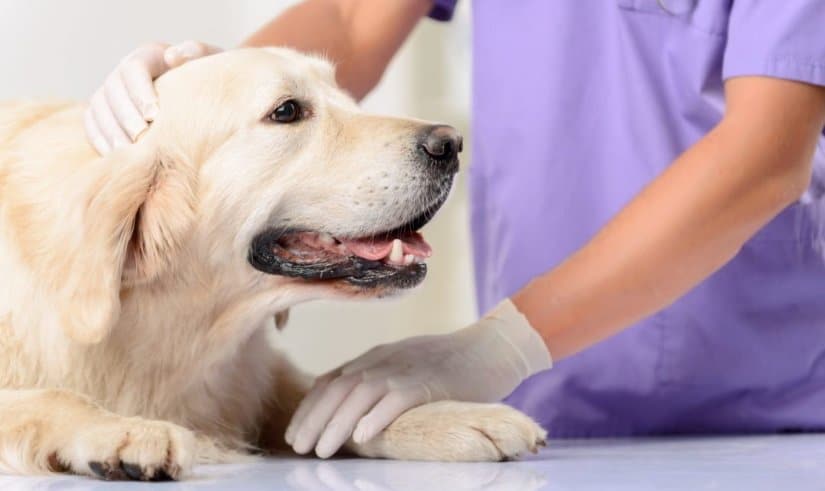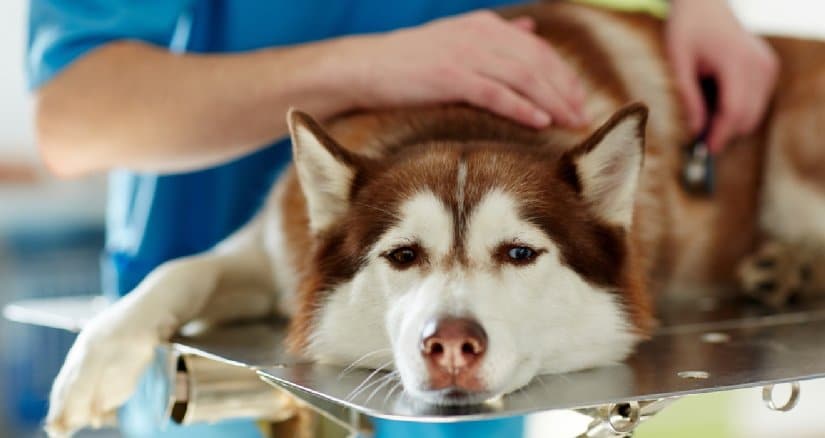Lymphoma’s in dogs are diverse, and need to be treated right away. If left untreated, your dog could die in as little as a few weeks. Chemotherapy treatment may allow for your dog to live for 1-3 more years.
The American Kennel Club (AKC) explains that
“Scientifically speaking, lymphoma is a blanket term used by doctors to describe a group of cancers that stem from the lymphocytes. Lymphocytes are a type of white blood cell that helps the immune system fight off infection. They are highly concentrated in organs that play a role in the immune system, like the lymph nodes, the spleen, and bone marrow. While lymphoma can affect any organ in the body, these organs tend to be where most lymphoma cancers are found”
The key to combatting lymphoma in dogs is to get an accurate diagnosis right away, and start treatment. Working together with your veterinary oncologist for as long as it takes, and ensuring that you have pet insurance that covers health issues like cancer will give your furry best friend a longer survival rate.
The Morris Animal Foundation explains that
“Lymphoma is defined as the malignant proliferation of lymphoid cells – the cells that carry out the body’s immune function – primarily affecting lymph nodes or solid organs such as the liver and spleen. In dogs it usually presents in middle-aged to older individuals, involves multiple organs, and affects males and females equally. Many dogs are asymptomatic at the time of diagnosis with only swollen lymph nodes to indicate disease.”
VCA Animal Hospital adds that lymphoma accounts for 15 to 20% of new cancers in dogs. Since National Canine Lymphoma Awareness Day is observed every year on November 7th, we thought to generate awareness in all dog lovers because lymphoma is one of the most common tumors in dogs.
What is Lymphoma?
Lymphoma, also known as lymphosarcoma is characterized by the enlargement of one or more lymph nodes. Additionally, lymphoma can occur in the lymph nodes, spleen, liver, and other organs.
A study from the University of North Carolina School of Medicine explains that
“Humans and their pet dogs are close, so close that they both develop a type of cancer called diffuse large B-cell lymphoma. In humans it’s the most common lymphoma subtype while in dogs, it’s one of the most common cancers in veterinary oncology,” via Science Daily.
The study goes on to add that
“Pet dogs get cancer the same way humans do: at similar rates, and for unknown reasons. Like humans, dogs’ tumors are spontaneously occurring, rather than genetically created as they are in mice, so canine tumors may more accurately mimic the situation in human cancer patients. Dogs are good models to study, because it will also be possible to study shared risk factors, in the environment, for example, that might predispose both humans and dogs to get lymphoma. Our knowledge helps dogs and humans with lymphoma.”
The study concludes that
“The team used gene expression profiling and found that canine B-cell lymphoma expression profiles were similar in many ways to human B-cell lymphoma, thus paving the way for future studies, including therapeutic clinical trials in dogs and humans.”
4 Types of Lymphoma
There are four distinct forms of lymphoma in dogs. Multicentric, where it originates in numerous places, alimentary, when it occurs in the digestive system, mediastinal, when it occurs in the chest, and lastly, extranodal, which may involve the kidneys, central nervous system, or skin.
Breeds Most Affected

Breeds that have a higher than average risk of developing this disease include the following:
- Rottweilers
- Scottish Terriers
- Bullmastiffs
- Boxers
- Basset Hounds
- Airedales
- Saint Bernard’s
- Bulldogs
- Golden Retrievers
Additionally, research has shown that some breeds may be predisposed to getting this type of cancer after being spayed or neutered.
The 2020 study by the University of California, Davis,on neutering to avoid health risks like lymphoma offers results from a 10-year study. The researchers examined 35 dog breeds and found vulnerability from neutering, and the age at which they are neutered, varies greatly depending on the breed.
The study discusses whether all dog breeds are affected in the same way? The researchers in this study say that “There is a huge disparity among different breeds,” said lead author Benjamin Hart, distinguished professor emeritus at the UC Davis School of Veterinary Medicine.
Hart adds that there is no “one size fits all” when it comes to health risks and the age at which a dog is neutered. “Some breeds developed problems, others didn’t. Some may have developed joint disorders but not cancer or the other way around.”
The researchers analyzed 15 years of data from thousands of dogs examined each year at the UC Davis Veterinary Medical Teaching Hospital to try to understand whether neutering, the age of neutering, or differences in sex when neutered affect certain cancers and joint disorders across breeds. Cancers examined include lymphoma; hemangiosarcoma, or cancer of the blood vessel walls; mast cell tumors; and osteosarcoma, or bone cancer.
This study says that
“Researchers also found the occurrence of cancers in smaller dogs was low, whether neutered or kept intact. In two breeds of smaller dogs, the Boston Terrier and the Shih Tzu, there was a significant increase in cancers with neutering.” The researchers also said that the sex of the dog sometimes made a difference.
“Female Boston terriers neutered at the standard six months of age, for example, had no increased risk of joint disorders or cancers compared with intact dogs, but male Boston terriers neutered before a year of age had significantly increased risks.”
Lymphoma Symptoms
- Loss of appetite
- Lethargy
- Weight loss
- Vomiting
- Diarrhea
- Weakness
- Fever
Can My Dog Survive Lymphoma?

Treatment of lymphoma in dogs can be positive, yet the survival time is not long, and may allow for up to a year with treatment with some types of lymphoma. If your furry best friend has multicentric canine lymphoma and chemotherapy treatment, the outcome is better with more than 90% of all dogs having a positive result.
If your dog has B-cell lymphoma, then treatment with chemo may allow for 9-12 months survival time, and dogs with T-cell lymphoma may live up to 6 months or less.
Your veterinary oncologist will come up with a specialized treatment just for your dog, and this will include drug treatment, dosage, and length of time for the treatment plan.
Vet Info Explains the Four Stages of Lymphoma

Stages of Lymphoma in Dogs
- Stage 1 where the lymphoma is restricted to a single lymph node in the body or in an organ.
- Stage 2 lymphoma involves two or more lymph nodes in a specific area of the body.
- Stage 3 lymphoma is generalized in nature and involves several lymph nodes around the body.
- Stage 4 lymphoma manifested in the dog’s spleen or liver.
- Stage 5 lymphoma is more aggressive in nature and involves the bone marrow, blood and other vital organs.
They add that “during the diagnosis of canine lymphoma the vet will perform a complete blood count test along with biopsies or fine needle aspirate tests. This will enable the vet to determine the type and severity of lymphoma present. Lymphomas are categorized into different stages according to the number of lymph nodes and organs involved,” via VetInfo.
Other breeds may also develop lymphomas. If you notice that your dog is suffering from a shortness of breath, or is vomiting with weight loss and diarrhea, you should consult with your veterinarian for a full check-up. Also, if you notice lumps on your dog’s skin which could either be a single lump, or multiple lumps in the mouth or skin surface. These lumps may be itchy and red.
As usual, regular veterinary check-ups are important for good health and longevity. Opt for a good pet insurance that covers preexisting conditions and cancers, so that you don’t have to worry about oncology bills.
Good nutrition is probably just as important throughout your dog’s life, and most especially during puppyhood and adolescence. You can also add cancer fighting supplements toward cancer prevention. Consult with your vet as to the best supplements for your furry best friend.
